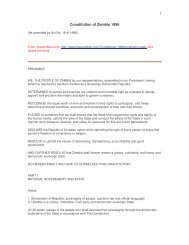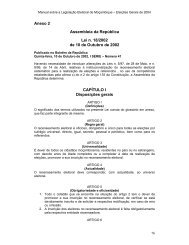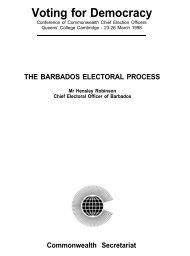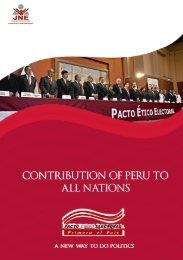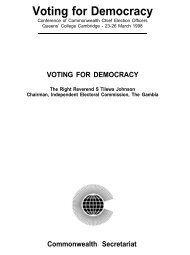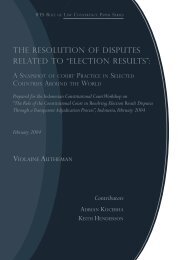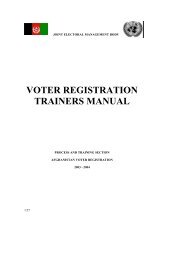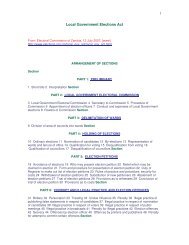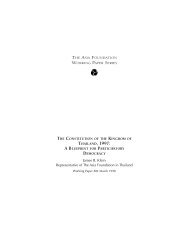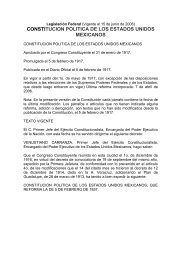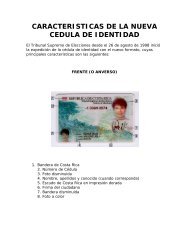Electoral systems and the protection and participation of minorities
Electoral systems and the protection and participation of minorities
Electoral systems and the protection and participation of minorities
You also want an ePaper? Increase the reach of your titles
YUMPU automatically turns print PDFs into web optimized ePapers that Google loves.
tion if <strong>the</strong>se whole classes <strong>of</strong> people were excluded fromrepresentation. The presence in government <strong>of</strong> groupsthat had previously been discriminated against might helpto break down ignorance <strong>and</strong> intolerance. Finally, <strong>and</strong> <strong>of</strong>most importance to constitutional design in transitional<strong>and</strong> post-conflict democracies, <strong>the</strong> inclusion <strong>of</strong> <strong>the</strong> diversity<strong>of</strong> majorities <strong>and</strong> <strong>minorities</strong> within legislatures canreduce group alienation <strong>and</strong> violence in those dividedsocieties where politics is <strong>of</strong>ten viewed as a win-or-losegame. Many peace settlements over <strong>the</strong> last 25 years haverevolved around inclusive electoral <strong>systems</strong> or reservedseats for communal groups as part <strong>of</strong> broader power-sharingconstructs. Democratization in South Africa hasshown that <strong>the</strong> representation <strong>of</strong> alienated <strong>minorities</strong>helps to mitigate anti-system violence <strong>and</strong> engenders anatmosphere <strong>of</strong> cooperation. 6Minority group pre-determinationor self-determinationOne key question, when it comes to <strong>the</strong> representation <strong>of</strong><strong>minorities</strong>, is whe<strong>the</strong>r a separate voters roll should bemaintained for <strong>the</strong> minority to be able to elect <strong>the</strong>ir ‘own’c<strong>and</strong>idates. Minority groups – whe<strong>the</strong>r based on language,ethnicity, religion or any o<strong>the</strong>r identity – coalesce ei<strong>the</strong>rvoluntarily, coercively or by some mixture <strong>of</strong> <strong>the</strong> two. Evenif identities are historically crafted <strong>and</strong> fluid (see DeborahKaspin on Malawi for a good example <strong>of</strong> identity formationaffecting politics in a democratizing African state), 7electoral politics may still allow for groups to define <strong>the</strong>mselves<strong>and</strong> come toge<strong>the</strong>r as political blocks voluntarily.This is ‘self-determination’ where labels are not imposedfrom <strong>the</strong> outside; ra<strong>the</strong>r, <strong>the</strong>y are adopted <strong>and</strong> claimed byindividuals who see <strong>the</strong>mselves as part <strong>of</strong> a collectivegroup. 8 The alternative is where political institutions predeterminewho is a member <strong>of</strong> each group on <strong>the</strong> basis <strong>of</strong>criteria that range from being rational <strong>and</strong> legitimate tosuspect <strong>and</strong> oppressive. Apar<strong>the</strong>id South Africa was anexcellent example <strong>of</strong> <strong>the</strong> evils <strong>of</strong> a deeply flawed system <strong>of</strong>ethnic classification, that created a straitjacket throughwhich oppression could be meted out.Unfortunately, many peace settlements rest upon apre-determined view <strong>of</strong> who, <strong>and</strong> how large, <strong>the</strong> variousconflicting groups are, <strong>and</strong> this can create a rigid foundationwhich retards <strong>the</strong> growth <strong>of</strong> cross-cutting,multi-ethnic, political movements <strong>and</strong> can exclude<strong>minorities</strong> that are not party to <strong>the</strong> conflict. Whileelections to <strong>the</strong> Nor<strong>the</strong>rn Irish Assembly do not predeterminevoters’ ethnic affiliations, <strong>the</strong>y do requireparliamentarians to identify <strong>the</strong>mselves as Unionist/Protestant, Nationalist/Catholic, or non-aligned.By <strong>the</strong>ir very definition, communal rolls, reserved seats<strong>and</strong> race-conscious districting rely upon a pre-determinedassessment <strong>of</strong> what constitutes a group <strong>and</strong> how largesuch groups are. New Zeal<strong>and</strong> is more flexible in allowingvoters to choose between being on <strong>the</strong> Maori or generalvoters’ roll, but <strong>the</strong>re does exist in law <strong>the</strong> capacity to bechallenged if one registers as a Maori <strong>and</strong> (as yet rarelyused) judicial guidelines revolve around blood lines <strong>and</strong>one’s ‘Iwi’, or Maori community, attachment. Much criticism<strong>of</strong> power-sharing <strong>the</strong>ories <strong>of</strong> democracy has revolvedaround <strong>the</strong> belief that such arrangements segment a societyinto fixed <strong>and</strong> pre-determined groups, which act as<strong>the</strong> pillars <strong>of</strong> an elite cartel that is more interested in selfenrichmentthan in representing <strong>the</strong>ir communities.The key conundrum inherent within separate communalvoters’ rolls is how to choose which groups are awardedseats or are recognized as eligible for special treatment.What are <strong>the</strong> building blocks for <strong>the</strong> power-sharing settlement<strong>and</strong> who has (or needs) special rights? Do minoritygroups have to be small <strong>and</strong> oppressed, or can <strong>the</strong>y besmall <strong>and</strong> powerful? And what constitutes a clearly definedethnic group to begin with? In Kosovo, <strong>the</strong> small Egyptiancommunity made claims that <strong>the</strong>y should be treated on apar with minority Serbs. In Denmark <strong>and</strong> Germany, <strong>the</strong>minority groups allotted special privileges are Europeannational <strong>minorities</strong>, not <strong>the</strong> equally large immigrant communitiesfrom Africa, Asia or <strong>the</strong> Middle East. In Bosnia,citizens are boxed into Bosniac, Croat or Serb identitiesthat effectively deny <strong>the</strong> existence <strong>of</strong> smaller minoritygroups (such as <strong>the</strong> Roma) or those Bosnians who aremulti-ethnic or claim no ethnic identity at all. A too-rigidview <strong>of</strong> what constitutes an ethnicity may not gain purchaseon <strong>the</strong> important political divisions in society.Second, pre-determination within power-sharing settlementscan exclude <strong>the</strong> weaker groups that are notparty to <strong>the</strong> chief conflict. Significantly, this means <strong>the</strong>irvoices are silenced precisely because <strong>the</strong>y are not in <strong>the</strong>midst <strong>of</strong> <strong>the</strong> violence. The Batwa ethnic group <strong>of</strong> Rw<strong>and</strong>awere overlooked <strong>and</strong> excluded in <strong>the</strong> seat allocationaspects <strong>of</strong> that country’s peace settlement because <strong>the</strong>conflict revolved around Hutus <strong>and</strong> Tutsis. In Sudan,smaller <strong>minorities</strong> were excluded from <strong>the</strong> north–southComprehensive Peace Agreement. 9 Armenians <strong>and</strong>Maronites were side-lined in Cyprus because TurkishCypriots refused to allow any o<strong>the</strong>r groups to acquireminority political status. 10Third, pre-determination <strong>of</strong>ten excludes <strong>the</strong> recognition<strong>of</strong> minority groups that are less visibly identified as ‘groups’:communities <strong>of</strong> interest which may still be identity basedbut are not ethnic groups as classically envisioned. Communitieslinked by sexual politics, gender issues, youth orage issues are almost never included as valid building blocks<strong>of</strong> a polity. The dangers <strong>of</strong> precluding non-ethnic identitiesfor ‘special recognition’ was demonstrated by farcical scenesin Nor<strong>the</strong>rn Irel<strong>and</strong> in November 2001 when three mem-6 ELECTORAL SYSTEMS AND THE PROTECTION AND PARTICIPATION OF MINORITIES



